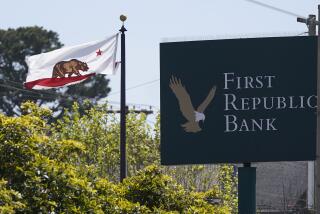Regulators adopt rules on economic risk for non-banking firms
- Share via
WASHINGTON — Trying to ward off a financial crisis like the one that shook the world in 2008, a powerful panel of federal regulators approved criteria for classifying which non-banking firms pose a risk to the entire financial system and are subject to tougher rules.
The new financial regulations are aimed at large, previously unregulated insurance companies, such as bailed-out American International Group Inc., as well as hedge funds, private equity funds and other firms whose complicated securities and bad bets on mortgages created a credit crisis and helped deepen the recession.
The financial woes and key failures of those firms put “enormous pressure on the banking system as a whole, significantly intensifying the magnitude of the crisis in the United States,” said Treasury Secretary Timothy F. Geithner, who chairs the Financial Stability Oversight Council.
The council, created by the 2010 law that overhauled financial regulations, is charged with devising and implementing rules for major corporations whose possible failures would put the nation’s economy at significant risk.
The rules adopted Tuesday apply to financial companies with more than $50 billion in total assets and with significant holdings of risky securities, such as derivatives and credit default swaps, that are similar to those blamed for the credit crisis.
The council also reserved the ability to consider the risk posed by any company, even if it does not meet those numbers.
Under the new rules, those judged by the panel to pose a risk to the economy would be regulated by the Federal Reserve and required to meet a set of stability standards.
Those standards are still being determined, but are likely to include rules about how much debt a company can take on and how risky its investments can be. The companies also are expected to have to produce details on how they are to be wound down in a crisis, in the hope of avoiding government bailouts.
The first companies to be designated as “systemically important financial institutions” are expected to be named by the end of the year.
Donald Lamson, a lawyer and former regulator who helped draft reforms after the financial crisis, said the government will have to be careful about how it implements the rules.
“In applying these criteria, the federal agencies are going to have to ensure that they both get an adequate sample of institutions and that they do not miss any large fish,” Lamson said. “At the same time, they don’t want to cast their net so far that they catch too many and lack the resources to adequately supervise those entities.”
The council, which comprises Fed Chairman Ben S. Bernanke, other top federal regulators and non-voting state officials, is charged with guarding the stability of America’s financial markets.
J. Stephen Zielezienski, senior vice president and general counsel for the American Insurance Assn., said that if the council sticks to the numbers in the rule, the property casualty members the association represents probably won’t fall under the council’s gaze.
“I suspect that it will continue to be the case that none of our member companies will be in the target zone,” Zielezienski said. But even with the council’s ability to investigate any company, he said, it should apply all the rules “sparingly.”
More to Read
Inside the business of entertainment
The Wide Shot brings you news, analysis and insights on everything from streaming wars to production — and what it all means for the future.
You may occasionally receive promotional content from the Los Angeles Times.










